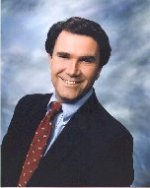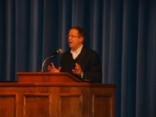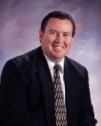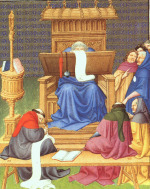 The Tenth in a Series of Sermons on Ephesians
The Tenth in a Series of Sermons on Ephesians
Have you ever been camping or hiking for a week or so in the woods? What do you look forward to the most when you return to civilization? How about a shower and change of clothing? According to the Apostle Paul, the desire to wash off the crud and to be clean is exactly how we as Christians ought to feel as we go through the process of sanctification. Those who have been made alive by Christ, by grace through faith, should be as disgusted by the guilt of our sins as we are with the stench of dirt and sweat on our bodies. In fact, in Ephesians 4:17-32, Paul discusses the Christian life in terms of a change in clothing. Paul instructs us to take off the old self with its sinful desires, and to put on the new self which is formed in the image of God.
As we continue our series on Paul’s letter to Ephesians, we are working our way through Ephesians 4, as Paul sets out the practical application of those same doctrines he set out in the first three chapters of this Epistle. I have divided this chapter into three sections so as not to rush through this very important discussion of the Christian life. In verses 1-6, Paul discusses the importance of Christian unity–a unity which is grounded in our common confession of faith. “One Lord, one Faith, one baptism, one God and Father over all, in all and through all.” In verses 7-16, Paul discusses Christ’s ascent into heaven and the gifts given to Christ’s church in the form of those who preach, teach, evangelize and shepherd God’s people, so as to bring the saints (as individual members of the one body of Christ) to maturity. Because Christ’s body is one, when it works together as it should, the members of that body are built up in love. As individual Christians mature, they grow together and the body functions properly. But there is a paradox here as well. When the body functions properly, the individual Christians mature more quickly.
In verses 17-32, Paul describes what amounts to a theological change of clothing. In verses 17-19, Paul begins by discussing the effects of sin upon the human race through the fall of Adam. Adam’s fall is the source of that which Paul calls the “old self”–which is that sinful human nature (or the “flesh”) into which we are were all born. In verses 20-24, Paul exhorts us to take off this old self and to put on a new self, which is being renewed in the image of God. Then, in verses 25-32, Paul describes the specific conduct which should result from putting on the new self. This includes things such as speaking the truth, doing honest work, guarding our speech, and loving our brothers and sisters in Christ, all the while remembering that since Jesus has forgiven us despite our many sins, so too, we are to forgive others with kindness and tenderheartedness. This is the goal (maturity) of that body of believers which is functioning well and which has been built up in love. Throughout this chapter (indeed, throughout this epistle), Paul places priority on sound doctrine as the basis for proper practice. In order to grow to maturity, we need to believe the right things about God and the human predicament.
To read the rest of this sermon, Click here
 Saturday, April 24, 2010 at 11:28AM
Saturday, April 24, 2010 at 11:28AM  “God applies his law to the family, to the church, and to the state in different ways. The church should extend forgiveness and reconciliation to a repentant sinner . . . . [Paul] tells the Corinthian church not to act like the state and administer punishment, because it is not the state. Instead, the church is the arena of redemption where reconciliation is extended to those who are repentant.”
“God applies his law to the family, to the church, and to the state in different ways. The church should extend forgiveness and reconciliation to a repentant sinner . . . . [Paul] tells the Corinthian church not to act like the state and administer punishment, because it is not the state. Instead, the church is the arena of redemption where reconciliation is extended to those who are repentant.”  Kim Riddlebarger
Kim Riddlebarger
 Believe it or not, this is a quote from Greg Bahnsen in the “Questions and Answers” section in Gary Scott Smith, ed., God and Politics, (Phillipsburg: P & R Publishing, 1989), 266.
Believe it or not, this is a quote from Greg Bahnsen in the “Questions and Answers” section in Gary Scott Smith, ed., God and Politics, (Phillipsburg: P & R Publishing, 1989), 266.










